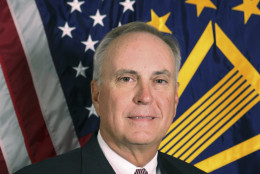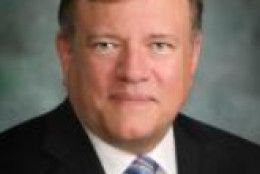Defense Department
-
Washington produces lots of opinions about the nation's military power and where it stands in relation to what's going on in the world. Most of them lack coherence, consistency and objectivity. That's according to Dakota Wood, senior research fellow at the Heritage Foundation. He's come up with a deeply researched index of U.S. military strength, just released. He spoke to Federal Drive with Tom Temin.
October 30, 2015 -
Creating more government innovation won't come without some creativity, some agency and industry experts say. Adam Tarsi, chief of staff of DoD's Combating Terrorism Technical Support Office, said agencies should widen their approach and position itself as an incubator for startup companies.
October 29, 2015 -
The F-35 Joint Strike Fighter program has two new problems to deal with. According to Stars and Stripes, the program's manager, Lt. Gen. Christopher Bogdan, told a House Armed Services subcommittee that his office wants to make the 5 1/2 pound helmet about 6 ounces lighter to prevent pilots that weigh less than 136 pounds from having their necks snap if they have to eject from the aircraft. The other problem is one of the international partners committed to buying the aircraft looks like it's going to bail out. New Canadian Prime-minster Justin Trudeau's campaign platform included cancelling Canada's participation in the F-35 program. Richard Aboulafia, vice president for analysis at the Teal Group, offers his take on In Depth with Francis Rose.
October 22, 2015 -
On this edition of Columbia Technology Partners’ Ready To Prime, Allen Scott is joined byMary Ostman, a retired contracting officer with 38 years of DoD experience under her belt.
October 21, 2015 -
The National Defense Authorization Act this year includes some big reforms for acquisition at the Defense Department. It's the latest attempt to improve how the government gets the things it needs. Bob Lohfeld, CEO and general manager of Lohfeld Consulting Group, wrote about the challenging search for good procurement practices. He wrote that he sees little evidence of convergence on the best acquisition practices. In Depth with Francis Rose asked him if he sees a convergence of the worst acquisition practices instead.
October 15, 2015 -
One of the fastest growing areas of fraud in the health care system is in the area of compounding pharmacies. James Burch, deputy inspector general for investigations in the Defense Criminal Investigative Service in the Office of the Inspector General of the Department of Defense, joined In Depth with Francis Rose on Pentagon Solutions. He discussed what led to the growing problem of compounding pharmacies.
October 14, 2015 -
The Homeland Security Department said it will reorganize the National Protection and Programs Directorate. The Government Accountability Office said the agency should consider four key areas as they plan the re-organization at NPPD. Chris Currie, director of homeland security and justice issues at GAO, testified at a House Homeland Security subcommittee hearing about those four key areas. He told In Depth with Francis Rose the GAO's High Risk list is the backdrop for what DHS should consider.
October 12, 2015 -
Congress is up against several deadlines when it comes back from recess next week. It's not just the Dec. 11 date, when the continuing resolution expires. The debt ceiling problem needs a solution by Nov. 5 and highway funding expires Oct. 29. One possible solution to the budget deadline is another CR that would last through the rest of fiscal 2016. Bob Hale, a fellow at Booz Allen Hamilton and former Undersecretary of Defense Comptroller, told In Depth with Francis Rose no CR is good for the department or the government.
October 12, 2015 -
The crisis points in the Middle East and the South China Sea are coming at an inconvenient time for the Navy. It's experiencing a carrier gap. Retired Vice Adm. Peter Daly is CEO of the U.S. Naval Institute; former deputy commander and Chief of Staff of U.S. Fleet Forces Command and former commander of the Nimitz strike group. He joined In Depth with Francis Rose to explain what the carrier gap is, why it's a problem and what the Navy and Congress can do to close it.
October 09, 2015 -
The fiscal 2016 defense authorization bill includes major acquisition reforms. The bill would give military service chiefs more power over the defense acquisition processes. The authorization bill may be in trouble though. President Obama has threatened to veto it. Federal News Radio's reporter Scott Maucione tells In Depth with Francis Rose about what Congress is calling for at DoD
October 06, 2015 -
The Senate will begin debate on this year's National Defense Authorization Act this week. Bloomberg reports a cloture vote is likely tomorrow, with a vote on approval after that. The House passed the conference report on the NDAA 270 to 156 Thursday. Andrew Hunter, senior fellow in the International Security Program and director of the Defense-Industrial Initiatives Group at the Center for Strategic and International Studies, told In Depth with Francis Rose the NDAA is a big deal every year, but this year it's even bigger.
October 05, 2015 -
The Senate Armed Services Committee called on the Defense Department to create a cyber defense policy. Members said they were concerned about a lack of definitive plans in case of a major cyber attack against the United States. All of this happened as the U.S. and China signed an agreement to stop cyber theft. Federal News Radio reporter Scott Maucione tells In Depth with Francis Rose more about Congress' concerns.
October 02, 2015 -
The defense authorization bill agreed upon by House and Senate negotiators would affect military pocketbooks in ways both big and small. It includes a 1.3 percent pay increase for uniformed service members but chips away at the military's pension system. In exchange for shrinking pensions, it encourages current troops — and mandates that future ones — invest in the Thrift Savings Plan.
September 30, 2015 -
Reps. Don Beyer (D-Va.) and Rob Wittman (R-VA) introduced the Federal Employee Retroactive Pay Fairness Act, which would secure retroactive pay for all federal employees during a government shutdown, regardless of furlough status.
September 29, 2015 -
The House of Representatives will vote this week on the fiscal 2016 National Defense Authorization Act. House Armed Services Committee Ranking Member Adam Smith told Bloomberg the House and Senate conferees have a deal, so the vote could come before Friday. That bill includes a provision that would give service chiefs more oversight over major acquisitions. Frank Kendall, the Undersecretary of Defense for Acquisition, Technology and Logistics recently gave some oversight of acquisitions to the secretaries of the service branches. But giving away that oversight is a bad idea no matter who OSD gives it to, Charles Tiefer, professor of contract law at the University of Baltimore School of Law and a former commissioner on the Commission on Wartime Contracting in Iraq and Afghanistan, told In Depth with Francis Rose. He wrote on Forbes about why he thinks the NDAA's reform is a bad idea.
September 29, 2015














